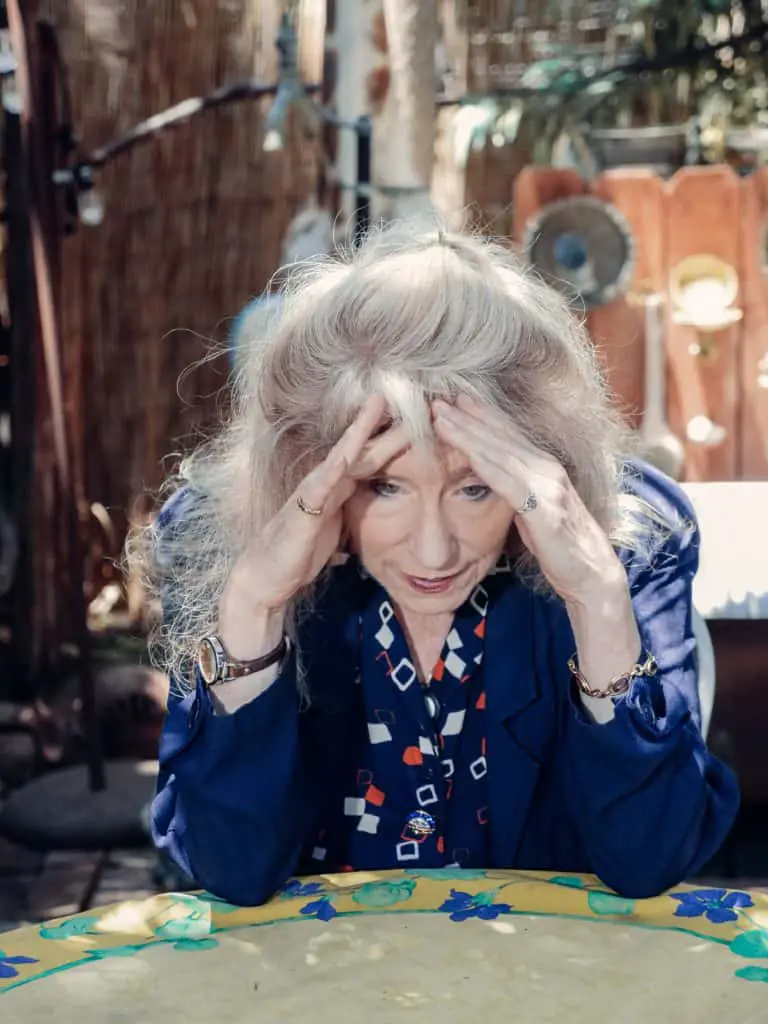
“It really is the long, long goodbye,” Nancy Reagan told Mike Wallace in a 60 Minutes interview about “caring for someone with Alzheimer’s disease…When you come right down to it, you’re in it alone, and there’s nothing that anybody can do for you,” she added, her stoic eyes turning watery. “So it’s lonely.”
Dementia Widowhood: Coping With Loss and Moving Forward
Your spouse has dementia. Are you now a dementia widow? Becoming a dementia widow is something that develops slowly over time but there is grief unending. There is no sudden loss but an unrelenting eroding of your spouse’s cognitive abilities. When your partner has dementia, you can anticipate sadness and stress over a lengthy period. You grieve for your partner and your loss of a partner. You are a witness to it all, and it can be heartbreaking because there is no known cure.
If you are caring for a spouse with dementia, you may be experiencing a wide range of emotions ranging from grief and frustration to exhaustion. When your spouse passes, you may feel a sense of relief that their suffering has ended, but you will also experience a new set of challenges. Studies have shown that widowhood can increase your own risk of developing Alzheimer’s disease.
Facing and accepting dementia in a family member is difficult. The disease robs your spouse of their memories, personality, and ability to communicate. The frustration you hear in their voice as they word search is agonizing. They are in there but can’t express what they are trying to communicate.
Losing Your Spouse and Your Support Community
As a caregiver, you have spent years providing support and care for your spouse. In the end, losing that role and the community that comes with it can leave you feeling lost. Know that you are not alone because there are agency resources available to help you cope with the challenges of dementia widowhood.
It’s important to care for your own health and well-being, both during your caregiving challenges and after your spouse passes away. This may include seeking support from friends and family, joining a support group, or getting professional counseling. It is truly sad that other family members may avoid visiting a dementia patient because they cannot face the reality. You may have found yourself quite alone on this caregiving journey.

The Impact of Dementia Widowhood
The death of a loved one can create a wide range of emotions, including sadness, anger, and loneliness. Mourning is a natural process that takes time, and everyone experiences it differently.
Widowhood can have a profound impact on your mental health. According to a study, widowhood can accelerate cognitive decline, which increases the risk of developing Alzheimer’s disease. Spousal caregiving, widowhood, and cognition are all linked and related.
In addition to the emotional impact, widowhood can also have financial consequences. You may need to make significant lifestyle adjustments such as downsizing your home or changing your retirement plans. All this in the aftermath of the loss of your partner is overwhelming. Seek financial advice and support.
Planning a memorial service or funeral is never easy. There are many decisions to make, such as choosing a venue, selecting music, and deciding on the type of service. Take your time and make decisions that feel right for you.
Remember that everyone experiences mourning differently, and there is no right or wrong way to grieve. Acceptance takes time.
The Intersection of Dementia and Widowhood
A diagnosis of dementia can be a shock to the system and can lead to feelings of fear, uncertainty, and anxiety. These emotions are compounded when the person with dementia is also a spouse. The thought of losing someone you know to dementia is a shock, and the grief process can begin long before the person has passed away. Symptoms can appear years before an actual diagnosis – sometimes subtle, often inscrutable.
Widows and widowers who have lost a spouse to dementia may experience post-traumatic stress disorder. PTSD, a condition that can develop after a person has experienced or witnessed a traumatic event can include flashbacks, nightmares, and anxiety.
The effects of dementia can also impact the grieving process. When a spouse has dementia, the relationship can change significantly. The person with dementia may no longer be able to communicate or connect with their partner. This can lead to feelings of isolation and loneliness for both partners. Add to that friends and family in denial who avoid confronting the condition by limiting their visits and support when most needed.
“The pleasure of remembering had been taken from me, because there was no longer anyone to remember with. It felt like losing your co-rememberer meant losing the memory itself, as if the things we’d done were less real and important than they had been hours before.”
― The Fault in Our Stars
In conclusion, the intersection of dementia and widowhood can be complex. Coping with the loss of a spouse even though they are still living and present, while also dealing with the symptoms of dementia is a huge challenge. Grieving begins long before the afflicted person has passed away.

Psychological Effects of Dementia Widowhood
Caring for a loved one with dementia can have a significant impact on your mental health. Here are some of the common psychological effects of being a dementia widow, including depression, anxiety, grief, denial, and fear.
Depression and Anxiety
You may feel overwhelmed and completely helpless. Depression and anxiety can also be caused by the physical and emotional toll of caregiving, as well as the social isolation that can come with the role. Dealing with behaviors typical of dementia can test a caregiver to the breaking point.
If you are experiencing symptoms of depression or anxiety, it is essential to seek help. Talk to your doctor or to a mental health professional about your feelings, and consider joining a support group for caregivers.
Grief and Denial
Grief and denial are common emotions that caregivers experience. You may feel a sense of loss for the person your loved one used to be, and it can be difficult to accept the changes that come with the disease. Denial is common in coming to terms with the fact that your loved one has a progressive and incurable condition.
Fear and Stress
You may legitimately worry about your spouse’s safety and well-being, especially if they’re in care. Fear and stress can also be caused by financial concerns. Caring for a loved one with dementia can be expensive if you augment care with private caregivers.
It is important to manage your stress. Take breaks and engage in activities that you enjoy. It’s too easy to put your own life aside when someone you love is vulnerable, but you matter too. Don’t be afraid to ask for help when you need it.
It is a tall order to take care of your own needs when you are basically on call 24/7 for someone who has become vulnerable, but necessary.
Physical Manifestations
Cognitive decline in your spouse can manifest in your experiencing physical changes. These symptoms can significantly impact your daily life. Here are some of the most common physical manifestations:
Behavioral Changes
You may notice that you are more irritable or agitated, anxious or depressed. It is important to remember that these changes in mood are a normal part of the grieving process.
Trouble Sleeping
Another common physical manifestation of dementia widowhood is trouble sleeping or staying asleep.
Forgetfulness
Forgetfulness is yet another physical manifestation of dementia widowhood. You may forget things more often or have trouble remembering important dates or events. Forgetfulness is a normal part of the grieving process. Try using a calendar or planner to help you recall important dates and events.

Role of Caregivers
As a caregiver, you play a vital role in supporting your loved one and helping them maintain their quality of life. Here are some important ways in which caregivers can provide support:
- Assistance with daily living activities: People with dementia may struggle with everyday tasks such as bathing, dressing, and eating. Within reason and within your capability, you can help your loved one with these activities to ensure they are safe and comfortable.
- Medication management: Your loved one must take their medications as prescribed. You can help manage their medications and ensure they are taking them in the proper dosage at the right time.
- Emotional support: You can provide emotional support to your loved one, listen to their concerns, and provide reassurance.
- Engagement in social activities: People with dementia may become isolated and withdrawn. Encourage your loved one to participate in social activities, such as visiting friends or attending community events.
- Education and advocacy: Frontline family caregivers play an important role in educating themselves and others about dementia. They are experienced and qualified to advocate for better care and support for people with the condition.
Support Systems For Dementia Widows
When you are a dementia widow, it is important to have a support system to help you manage your grief and cope with the challenges of caregiving. Here are two types of support systems that may be helpful to you:
Support Groups
Joining a support group can be a great way to connect with others who are going through similar experiences. These groups can provide emotional reinforcement, practical advice, and a sense of community. You can find support groups through organizations like the Alzheimer’s Association or your local hospice.
In a support group, you can share your feelings and experiences with others who understand what you are going through. You can also learn from others who have been through similar experiences and get advice on coping with caregiving challenges. Some support groups may also offer educational resources or guest speakers.
Hospice Care
Hospice care provides comfort and support to people who are nearing the end of their lives. Hospice care can be provided in a variety of settings, including in your home or in a hospice facility. Hospice care can be helpful for both the person with dementia and their caregiver.
Pain management, emotional support, and spiritual care are provided in hospice. Hospice care can also provide respite care, which can give the caregiver a break from caregiving responsibilities.
In conclusion, having a support system is essential when you are a dementia widow. Support groups and hospice care can provide emotional support, practical advice, and a sense of community. Consider reaching out to help you manage your grief and cope with the challenges of caregiving and the long goodbye.
Healthy Habits
Taking care of your health and establishing healthy habits is critically important at this time. In this section, we will look at things you can incorporate into your daily routine.
Diet and Exercise to Prevent Dementia
Maintaining a healthy diet and exercising regularly are two important habits that can help you stay healthy. A balanced diet that includes plenty of fruits, vegetables, whole grains, lean proteins, and healthy fats can provide your body with the nutrients it needs to function properly. In addition, regular exercise can help you maintain a healthy weight, reduce your risk of chronic diseases, and improve your mood.
Consider incorporating the following:
- Eat a variety of fruits and vegetables
- Choose whole grains over refined grains
- Limit your intake of red meat and processed foods
- Choose lean proteins like chicken, fish, and beans
- Incorporate healthy fats like nuts, seeds, and avocado into your diet
- If you can, aim for at least 30 minutes of moderate-intensity exercise most days of the week
Routines
Establishing routines can also be beneficial for your physical and mental health. The familiarity and comfort of routines can help reduce stress and anxiety, improve sleep quality, and provide a sense of structure and purpose. Consider incorporating the following into your daily life:
- Wake up and go to bed at the same time every day
- Incorporate relaxation techniques like meditation or deep breathing into your daily routine
- If possible, schedule time for physical activity
- Plan your meals and snacks in advance to ensure a balanced diet
- When possible, make time for hobbies and activities that you enjoy
Dementia Gender Differences
When it comes to dementia, there are differences between men and women. Who does dementia affect the most?
Men and Dementia
While women are more likely to develop dementia, men with dementia tend to have a faster decline in cognitive function. Studies have also shown that men with dementia are more likely to exhibit aggressive or violent behavior. How do you deal with a spouse with dementia exhibiting aggressive behavior? Experts advise not to argue. Try playing soothing music, engaging in outdoor walks, and avoiding loud environments, and only when necessary, medicate.
Women and Dementia
Women are more likely to develop dementia than men. In fact, two-thirds of Americans with Alzheimer’s disease are women. Women with dementia also tend to live longer than men with dementia.
In addition to these gender differences, there are also sex differences in dementia. For example, women who have gone through menopause may be at a higher risk for developing dementia due to hormonal changes.
Socioeconomic Factors
Socioeconomic factors can play a significant role in both the risk of developing the condition and the quality of care received. Your socioeconomic status can impact your access to education, healthcare, and resources that may help prevent or manage dementia.
Research has shown that individuals with lower socioeconomic status are at a higher risk of developing dementia. This may be due to limited access to healthcare, poor nutrition, and higher levels of stress. In addition, individuals with lower socioeconomic status may be less likely to engage in activities that promote brain health, such as exercise, socializing, and continuing education.
Furthermore, socioeconomic factors can also impact the quality of care received by individuals with dementia. Those with lower socioeconomic status may have limited access to healthcare services and resources. This can lead to delayed diagnosis and treatment. Caregivers from lower socioeconomic backgrounds may experience additional financial strain, impacting their ability to provide adequate care for their loved ones.
If we could address these disparities we could work toward a future where everyone has the opportunity to prevent and manage dementia.
Conclusion : 
Living as a dementia widow is heartbreaking, and the ultimate loss of that spouse can further compound one’s grief. It is important to recognize the potential impact of widowhood on cognitive health and take steps to mitigate this risk. Everyone experiences grief and loss differently, and there is no “right” way to mourn the loss of a spouse. However, seeking counseling or support groups provides a safe and supportive space to process emotions and navigate widowhood.
Overall, while the loss of a spouse is a wrenching emotional experience, there are steps you can take to support your cognitive health and well-being. By becoming engaged in activities that promote cognitive function, seeking out social support, and taking care of yourself both physically and emotionally, you can help maintain your cognitive abilities.
In spite of what has been a long traumatic journey as a dementia widow or as Nancy Reagan described it, “the long, long good-bye”, you can finally relax in the knowledge that you did your very best to provide quality of life for someone you loved in circumstances that were devastating..
